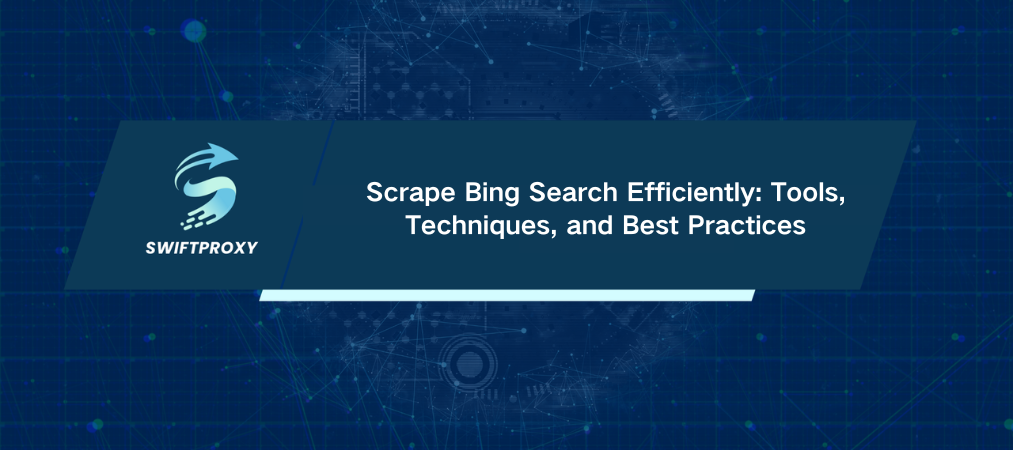Scrape Bing Search Efficiently: Tools, Techniques, and Best Practices

Bing often flies under the radar, overshadowed by Google's dominance. But that's exactly why scraping Bing search results can be a game-changer. Less saturated, more regional nuance, and surprisingly different results—Bing is a treasure trove waiting to be tapped.
In this guide, we'll walk you through how to scrape Bing using Python. Whether you're a data analyst, SEO pro, or developer hungry for fresh data, this is your fast track to extracting Bing's unique insights. We'll cover everything from simple Requests and Beautiful Soup scripts to powerful browser automation with Playwright—and even how to leverage scraping APIs for serious scale.
Let's dive in.
Why Scrape Bing Search
Google's search results get all the headlines. However, Bing delivers a distinct flavor of data. Why?
-
Cleaner, Less Cluttered Results: Bing's algorithm surfaces content Google often misses—especially niche blogs or local businesses.
-
Less SEO Noise: Fewer marketers obsess over Bing, so results aren't drowned in keyword-stuffed, clickbait garbage.
-
Regional and Enterprise Relevance: Bing powers searches on Microsoft devices and enterprise environments, giving you sharper insights for specific markets.
-
Unique Competitor Intel: Discover players ranking high on Bing but invisible on Google. That's a goldmine for strategy.
If you want fresh perspectives or hyper-local search data, Bing is where you start.
How Can You Use This Data
Here are real-world wins from scraping Bing search results:
-
SEO Monitoring: Track keyword rankings specific to Bing. Find pages that rank well here but not on Google.
-
Content Gap Analysis: Spot trending topics or unanswered questions Bing users ask. Perfect for product launches or content planning.
-
Competitive Research: Identify which competitors dominate Bing's SERPs. Adjust your messaging or strategy based on their footprint.
-
Audience Insights: Understand preferences and behavior of Bing's user base, especially in enterprise or regional niches.
In short, Bing scraping isn't just data collection. It's a strategic edge.
Tools and Techniques to Scrape Bing Search
Here's your toolkit overview—choose what fits your needs and skill level.
-
Manual Scraping: Copy-paste for tiny projects or demos only. Not scalable or efficient.
-
Python + Requests + Beautiful Soup: Lightweight, quick, great for static pages without heavy JavaScript. Perfect for scraping titles, URLs, snippets.
-
Playwright Browser Automation: For dynamic content, JavaScript-heavy pages, pagination, and mimicking real user behavior. Essential for advanced scraping.
-
Third-Party APIs: Want hassle-free scraping? APIs like Swiftproxy API handle proxies, rendering, CAPTCHAs, and more—all so you can focus on data.
If you scrape frequently or at scale, use proxies. Rotating residential or datacenter proxies keep your IP hidden and your requests smooth. Swiftproxy offers reliable proxy solutions perfect for this.
Setting Up Your Python Environment for Bing Scraping
Ready to roll? Here's how to prepare your workspace:
Install Python 3.7+
Verify with:
python --version
Create and activate a virtual environment
python -m venv bing-scraper-env
source bing-scraper-env/bin/activate # Windows: bing-scraper-env\Scripts\activate
Install required libraries
pip install requests beautifulsoup4 playwright
Install Playwright browsers
playwright install
Test your setup:
import requests
from bs4 import BeautifulSoup
response = requests.get("https://www.bing.com")
soup = BeautifulSoup(response.text, "html.parser")
print("Bing page title:", soup.title.string)
If you see "Search - Microsoft Bing," you're golden.
Basic Bing Scraper with Python
This script fetches Bing's search results HTML and extracts titles, URLs, and descriptions. It uses proxies and custom headers to avoid detection.
import requests
from bs4 import BeautifulSoup
proxy_user = "user"
proxy_pass = "pass"
proxy_host = "gate.example.com"
proxy_port = "7000"
proxies = {
"http": f"http://{proxy_user}:{proxy_pass}@{proxy_host}:{proxy_port}",
"https": f"http://{proxy_user}:{proxy_pass}@{proxy_host}:{proxy_port}",
}
headers = {
"User-Agent": "Mozilla/5.0 (Windows NT 10.0; Win64; x64) "
"AppleWebKit/537.36 (KHTML, like Gecko) "
"Chrome/120.0.0.0 Safari/537.36"
}
query = "samsung"
url = f"https://www.bing.com/search?q={query.replace(' ', '+')}&setlang=en&cc=US"
response = requests.get(url, proxies=proxies, headers=headers, timeout=10)
soup = BeautifulSoup(response.text, "html.parser")
results = soup.find_all("li", class_="b_algo")
for result in results:
title_tag = result.find("h2")
url_tag = title_tag.find("a") if title_tag else None
desc_tag = result.find("p")
title = title_tag.get_text(strip=True) if title_tag else "No title"
link = url_tag["href"] if url_tag else "No URL"
description = desc_tag.get_text(strip=True) if desc_tag else "No description"
print(f"Title: {title}")
print(f"URL: {link}")
print(f"Description: {description}")
print("-" * 80)
Proxy location impacts the language and regional results Bing returns. Use setlang and cc parameters to target specific locales and avoid empty results.
Using Playwright to Enhance Dynamic Scraping
Simple HTTP requests only go so far. Bing's results page has JavaScript, infinite scroll, pagination, and bot detection.
Playwright steps in here:
-
It renders JavaScript like a real browser, so you scrape the full page.
-
Handles clicks, scrolls, and pagination seamlessly.
-
Simulates human behavior to avoid bans.
-
Captures screenshots and videos for easier debugging.
If your scraping needs grow, Playwright is the go-to tool.
Leveraging Scraping APIs to Avoid the Hassle
Maintaining scraping scripts can be a nightmare. UI changes, CAPTCHAs, proxy management... the list goes on.
Scraping APIs take all that off your plate.
Here's a minimal example using their API:
import requests
url = "https://example.com/v2/scrape"
payload = {
"target": "bing_search",
"query": "samsung",
"page_from": "1",
"num_pages": "10",
"parse": True
}
headers = {
"accept": "application/json",
"content-type": "application/json",
"authorization": "Basic [your_basic_auth_token]"
}
response = requests.post(url, json=payload, headers=headers)
print(response.text)
This API handles proxy rotation, JavaScript rendering, error retries, and more—freeing you to focus on insights.
Final Thoughts
Bing scraping is more than just a nice-to-have—it's a powerful method to uncover insights hidden from Google's spotlight. Whether you rely on lightweight Python scripts, Playwright automation, or scraping APIs, you now have a clear roadmap to access Bing's unique search data. Proxies are essential in this process; skipping them will quickly lead to blocks. Use these methods to explore Bing's results and elevate your data game.

















































